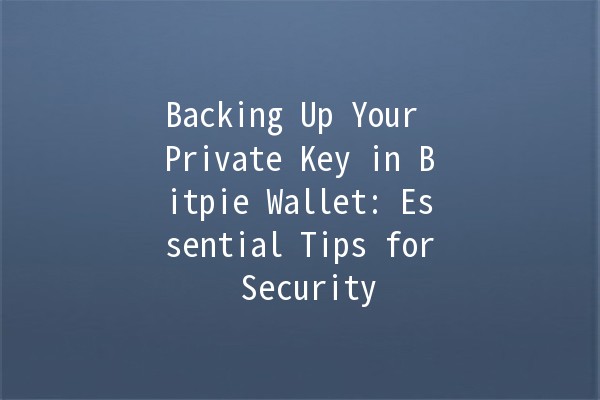




In the everevolving world of cryptocurrencies, securing one’s assets is a top priority for every user. One crucial aspect of this security is the backup of private keys associated with cryptocurrency wallets. In this article, we’ll explore the significance of backing up your private key in the Bitpie Wallet, while also providing practical tips and strategies to enhance your security.
Before diving into specific techniques, it’s crucial to understand why backing up your private key is essential. A private key functions as a password that allows you access to your cryptocurrency holdings. If you lose your private key, you lose access to your funds permanently. Consequently, keeping your private key backed up ensures that you can recover your wallet in case of device loss, theft, or damage.
Permanent Loss: Without a backup, if your device is lost or damaged, you will lose access to your funds.
Increased Risk of Theft: Without proper backup practices, your assets may be at risk if your wallet is hacked, as you may not be able to restore your funds.
Description: Don’t rely on just one method to back up your private key. Use a combination of digital and physical backups to ensure redundancy.

Practical Application: Store your private key digitally on a secured cloud service with encryption, and also print it out on paper, storing it in a safe or safety deposit box.
Description: When backing up your private key digitally, always use encryption to add an additional layer of security.
Practical Application: Use software like VeraCrypt to create an encrypted file containing your private key. Ensure you remember your encryption password, as losing access to this will also prevent you from accessing your keys.
Description: The physical location where you store your backups is crucial to your security.
Practical Application: For paper backups, consider using a fireproof safe. For digital backups, use strong passwords and consider a trusted service known for its security features.
Description: As you make transactions or change wallets, it’s essential to update your backup to reflect the current private key.
Practical Application: Every couple of months, review your backup methods and ensure that your current key is stored securely, repeating the encryption and storage steps.
Description: Understanding common security threats can help you protect your backups.
Practical Application: Regularly educate yourself about the latest phishing tactics and fraud schemes related to cryptocurrency wallets. Use antivirus software and avoid clicking on unknown links.
Bitpie Wallet is a popular multicurrency wallet that allows users to store various cryptocurrencies securely. Here’s an overview of how to effectively use Bitpie Wallet and enhance its security.
Once your wallet is set up and backed up:
Adding Cryptocurrencies: You can receive various cryptocurrencies by sharing your wallet address with others.
Sending Cryptocurrencies: Use the app to send funds securely, always doublechecking recipient addresses to avoid sending to the wrong wallet.
Losing your private key means you will lose access to your funds permanently. Always ensure you have multiple secure backups.
If your backups are encrypted, forgetting the password means you may only recover the funds through other backups. It's crucial to store passwords securely alongside your private key backups.
While it is convenient, storing your private key on your phone can expose you to vulnerabilities. Always consider encrypting it and using a reputable security app if you decide to store it there.
Online backups can be convenient, but they increase the risk of hacking. Always prefer offline methods or encrypted cloud storage.
The most secure method involves multiple backups: an encrypted digital copy and a physical printed copy stored in a secure location.
It’s recommended to review and update your backup every few months or after significant transactions to ensure your backup reflects the current private key.
Securing your cryptocurrency investments is a fundamental responsibility for anyone using digital wallets like Bitpie. By following the key tips laid out in this article, you can better protect your private key and ensure access to your assets even in the face of potential risks. Engaging with the community and staying informed on security best practices will further enhance your security posture.
By implementing these strategies, you create a solid foundation for safeguarding your cryptocurrencies and mitigating the risk of loss. After all, in the world of digital assets, knowledge and preparation are your best defenses.